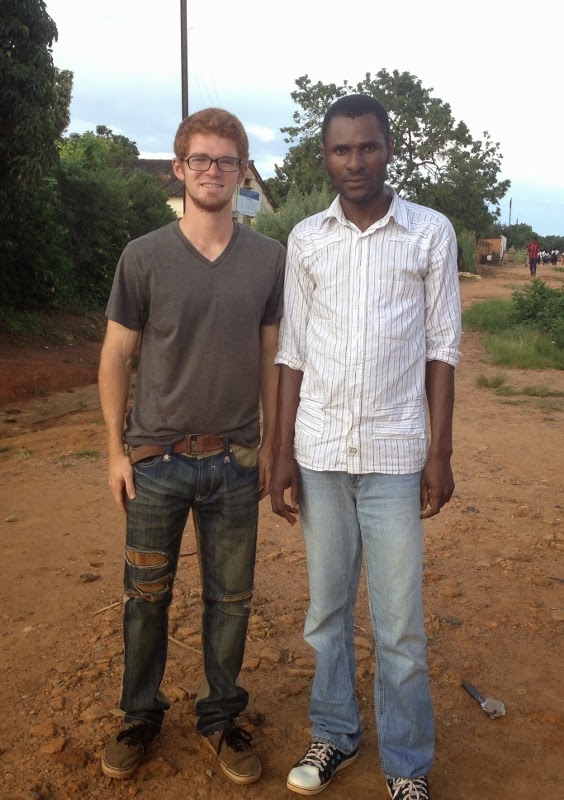I changed the name of this blog. I'll explain about that in the next entry because I feel that it's an important message in itself. Here's the current post for now:
Sometimes we just need to shut up and listen.
Sometimes we just need to shut up and listen.
 |
| Pasteur Ilunga, pastor of the mother church of Pasteur Ezechiel's church, telling the good news about Jesus at Pasteur Job's funeral. |
Pastor Job was
a well-loved upright professor at one of the Bible schools in Lubumbashi. Unfortunately, after a lengthy struggle with cancer,
he passed away. We attended his funeral
service. After a moving address and poignant
message about the need to repent of wrongdoing and trust in Jesus’ payment for
our forgiveness, the hearse took off to a cemetery on the outskirts of the
other side of town. Once we arrived we
had to wait our turn to enter the graveyard and have the burial conducted.
As we waited
with our Congolese friends outside the gate amidst the rural Katangan
landscape, I noticed our Congolese friends’ foreboding tension. Something about this was not normal.
An
unbelievably rapid series of events fulfilled that apprehension. Gate opens.
Crowd moves to pavilion. Hearse
backs in. Workers in construction
clothes haul out coffin. Minister orates
short prayer and biography. Workers
carry coffin to gravesite. Family and
guests follow. Family grieves as coffin
is lowered. Attendants hurry wailing
family away. Long line of guests quickly
passes grave. Group exits cemetery.
Just before
we left, we saw a white man who I assumed to be the funeral director. Bill went over to talk to him, and what I
overheard from their conversation shook the way I listened to
others.
The director
said he was all about dignity and respect and he wanted to build gravesites
that provided that. Our Congolese
friends interpreted his efforts much differently, though. Pasteur Ezechiel rode with us on the way home
and fumed about how he felt everything opposite of dignity and respect during
the funeral. The phrase he hammered over
and over was “That’s now how the Congolese bury people.”
Congolese
customs and values that this European director trampled on surfaced many times
during his diatribe. Pasteur Ezechiel ranted
about everything from the concreted-over grave parcels and the over-structured business-feel
to the event, but what bothered him most was how the attendants flew through
the service and even pulled away the mourning family from the grave to speed
the line along for the next funeral. He
said that normally the Congolese cry for hours at burial ceremonies, but these
guys hardly gave Pastor Job’s family 5 minutes to bemoan his interment.
 |
Workers moving a casket from the pavilion
to a grave site. |
I saw a
spectacle that highlighted the contrast in cultural customs while walking home
from the Ruashi church one day. I looked
up from gazing at the walkway to avoid tripping over a rock sticking out of the
ground or stepping in a stream of water trickling out of an alley and noticed a
tarp stretched across the avenue a ways down. Many people were standing around and even a
few cars were parked in the path. Curious,
I cautiously approached and soon recognized what was going on. Whenever someone dies, usually family and
friends will visit the bereaveds’ house during the days following. After finding out that it was indeed a
funeral, and I gave my consolations and continued home.
 |
| This is the area Pasteur Job was laid to rest in. |
For six continuous
days later there were still visitors mourning with the family.
Although the
director may have had business reasons for running the whole procession in less
than 30 minutes, there wasn’t much about it that communicated dignity and
respect to Pasteur Ezekiel. It didn’t
matter what the director’s intentions were because his actions ignorant of
Congolese traditions resulted in frustration.
Lesson for people
seeking to serve others cross-culturally:
When interacting with those from other cultures, it’s important to be knowledgeable
about their customs. Understand that
both yours and theirs are good and valid, but since you are there to serve
them, you need to serve them on their terms.
So ask them. Talk to them. Humble yourself and adapt your preferences to
theirs.
Lesson for anyone
else: Listen to others. It’s so easy, especially in our American
individualistic “speak my mind” culture, to blab first and not even consider
listening to the other’s experiences later.
I’m sure guilty of it. If that’s
your confession too, it’s a good thing that the Holy Spirit develops in us the patience,
compassion, and humility necessary to listen first. Even though we may have constructive
intentions, our ignorance of others’ situations greatly increases the chances
of miscommunication and irritation.
“You cannot listen to the word another is speaking if you are preoccupied with your appearance or with impressing the other, or are trying to decide what you are going to say when the other stops talking, or are debating about whether what is being said is true or relevant or agreeable. Such matters have their place, but only after listening to the word as the word is being uttered.”
--William Stringfield













.jpg)
.jpg)
.jpg)
.jpg)
.jpg)